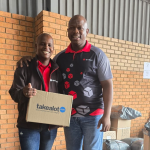SPONSORED CONTENT
Serious about fighting corruption? Then protecting whistleblowers must be a top priority.

Whistleblowing is a powerful anti-corruption tool. We need strong laws that enable safe whistleblowing, and this is even more important in countries with high levels of crime and corruption
South Africa has embarked on a significant programme to promote ethics and the principles of good governance, placing emphasis on openness, transparency, and accountability. This is most evident in initiatives such as the National Anti-Corruption Strategy (NACS) adopted in November 2020.
Speaking at the Whistleblower Protection Week, co-hosted by the Platform to Protect Whistleblowers in Africa (PPLAAF) and the Friedrich Naumann Foundation (FNF) at GIBS Business School in December 2022, Acting Public Protector Adv Kholeka Gcaleka emphasised the importance of whistleblowing in fighting corruption:
“[T]he willingness of courageous individuals to reveal or ‘blow the whistle’ on wrongdoing and malpractice in both the public and private sectors plays an integral role in our country’s fight against corruption, strengthening democracy and accountability, limiting mismanagement, saving lives, protecting the environment, upholding the rule of law, and ensuring the proper use of public resources.”
Yet despite all the anti-corruption efforts in South Africa, far too many whistleblowers are assassinated: Jimmy Mohlala, James Nkambule, Babita Deokaran, Eric Phenya, and Cloete Murray are just some among many whose lives have been cut short because they did the honourable thing of exposing wrongdoing. This shows us in unambiguous terms what is at stake for whistleblowers.
So, how can we – in all good conscience – promote whistleblowing when we know its consequences are far too often lethal? How can we teach ethics, accountability, integrity, and extol the virtues of whistleblowing in the face of such great danger? The Protected Disclosures Act (PDA) attempts to offer protection against harm when someone discloses wrongdoing. However, retaliation tactics by employers fall under a different category of law, namely labour law. Whistleblowers are often subjected to spurious labour law processes which tend to be drawn out and costly. Often the aim of such cases is to exhaust and drain the whistleblower until they are so broken, traumatised, and frankly soul-destroyed that they throw in the towel. So much for those who merely want to do the right thing. Who would want to blow the whistle knowing what can happen?
But it is not only whistleblowers who suffer under these circumstances; rampant corruption involving the public sector harms the citizens of South Africa. If people are empowered to disclose wrongdoing without fear of retaliation, victimisation or assassination, public assets and funds will be saved and the quality of public service will improve, benefitting the country’s citizens.
That said, South Africa’s whistleblower law is inadequate and requires reform. Below I outline some important types of reform required (of course there are many more).
First, we need a whistleblowing law that ensures the empowerment to disclose wrongdoing. If a company, organisation, or government department does not have a whistleblowing empowerment initiative under its “whistleblowing policy”, then whistleblowing cannot and should not be promoted. A whistleblowing empowerment project would begin with education on the internal and external routes for blowing the whistle, ensuring protection at every stage, enshrined in a policy.
Second, we need a law that encapsulates whistleblowers from labour law proceedings until their disclosure of wrongdoing has been properly dealt with and closed, by and/or with the support of the employer and a suitably qualified and properly appointed independent arbiter.
There is also a dire need for the provision of physical protection of whistleblowers when their safety is threatened. A whistleblower law that does not protect whistleblowers from being fired, harassed, intimidated, discriminated against, assaulted, or even killed is simply not good enough. On paper, the PDA provides for protection against some detriments; however, whistleblower stories demonstrate how ineffectual it is in providing holistic protection.
Given the legislative framework in place, whistleblowing is a legal process. It needs to be treated as such and its promotion should be coupled with training employees on how to go about it safely, thoughtfully, and strategically. This legal process demands a whistleblower support and protection ecosystem. However, the current framework costs the whistleblower and not the wrongdoer. One only has to listen to the stories of Mosilo Mothepu, Mthabisi Moyo, Bianca Goodson, Martha Ngoye – and many more who are still in the “whistleblowing tumble dryer” trying to piece their lives back together – to see how the current framework is failing those it purports to protect.
Adv Kholeka Gcaleka ended her speech at the 2022 whistleblower protection week with this: “Ultimately it is the action taken against transgressors, and not against whistleblowers, that will determine the success of an organisation’s efforts to create a safe environment for reporting misconduct.”
Together with significant legal reforms, it is ultimately a culture of whistleblower protection that we must cultivate. We can all play a role in doing this.
PPLAAF is a non-governmental organisation established in 2017 to protect whistleblowers, as well as to advocate for better whistleblower protection and to engage in strategic litigation on whistleblowers’ behalf when their revelations deal with the general interests of African citizens.
For more information on safe whistleblowing, please visit www.pplaaf.org DM/MC
Author: Pusetso Morapedi, Director, Southern Africa, Platform to Protect Whistleblowers in Africa (PPLAAF)

















 Become an Insider
Become an Insider